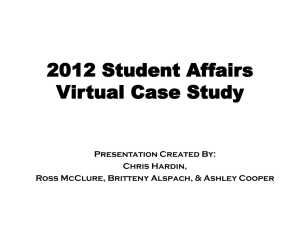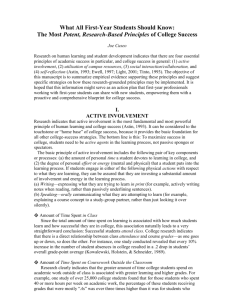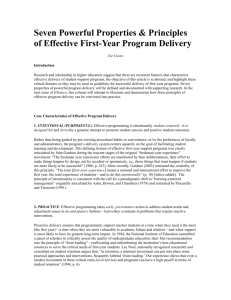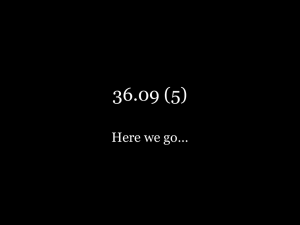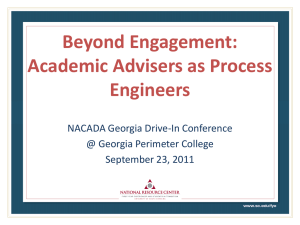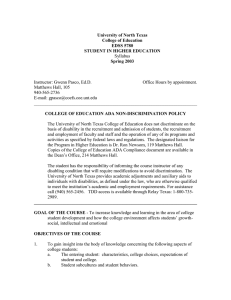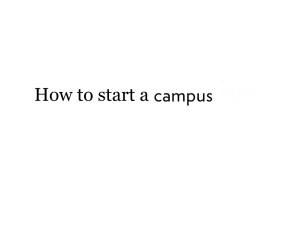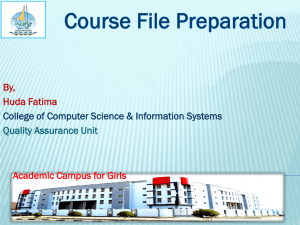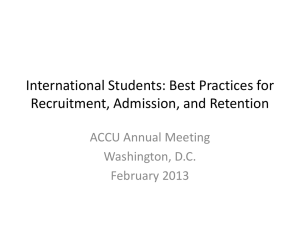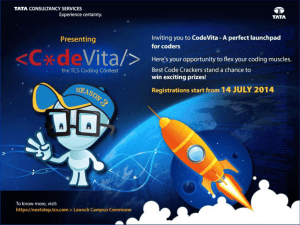The Diamond of College Success
advertisement
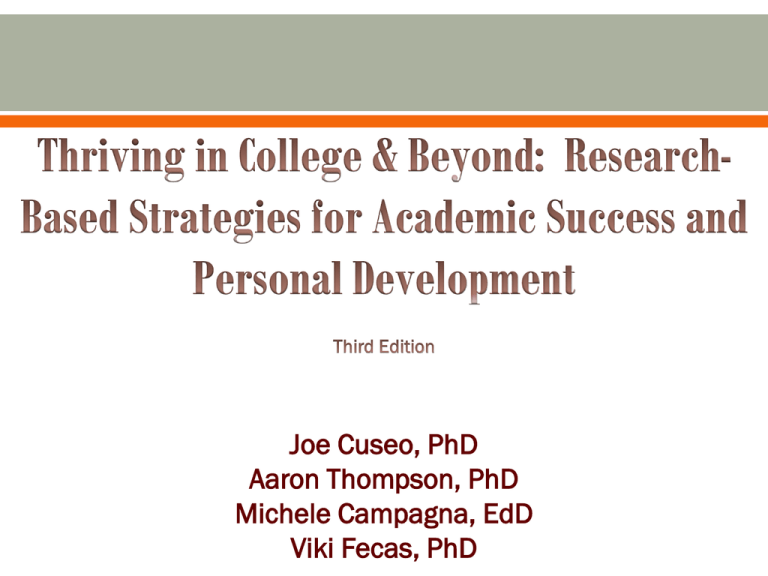
Joe Cuseo, PhD Aaron Thompson, PhD Michele Campagna, EdD Viki Fecas, PhD To equip you with a set of powerful success strategies you can use immediately to get off to a fast start in college and can use continually throughout your college experience to achieve success Research on human learning and student development indicates four powerful principles of college success: Active Involvement; 2. Use of Campus Resources; 3. Interpersonal Interaction and Collaboration; and 4. Personal Reflection and Self-Awareness (Astin, 1993; Kuh, 2000; Light, 2001; Pascarella & Terenzini, 1991, 2005; Tinto, 1993). 1. Utilizing Campus Resources Interpersonal Interaction and Collaboration Active Involvement Personal Reflection and Self-Awareness = Supporting Bases for College Success = Primary (“Home”) Base for College Success Research indicates that active involvement may be the most powerful principle of human learning and college success (Astin, 1993; Kuh, 2000). Involves the following pair of processes: o The amount of personal time you devote to learning in the college experience; o The degree of personal effort or energy (mental and physical) you put into the learning process. 100% Percentage of Classes Attended 90% 80% 70% 60% A B C D Final Course Grades F W Studies clearly show that when college students spend more time on academic work outside of class the result is better learning and higher grades (National Survey of Student Engagement, 2003). Research on college graduates indicates that the higher their college grades, the higher o The status (prestige) of their first job; o Their job mobility (ability to change jobs or move into different positions); and o Their total earnings (salary). The best way to apply the principle of active involvement during a class lecture is to engage in the physical action of writing notes. Use the following strategies to improve the quality of your note taking. Get to every class Get to every class on time Get organized Get in the right position Get in the right frame of mind Get it down (in writing) Don’t let go of your pen Finish strong Stick around Arrive at class prepared Ask relevant questions Contribute thoughtful comments during class participation Taking notes on information that you’re reading, or on information you’ve highlighted while reading, helps keep you actively involved in the reading process because it requires more mental and physical energy than merely reading material or passively highlighting sentences. Come fully equipped o Writing tool and storage o Dictionary o Glossary of terms Get in the right position o Upright and with light coming from behind you Get a sneak preview o Boldface headings, chapter outline, summary, end-ofchapter questions Use boldface headings and subheadings Pay attention to the first and last sentences Finish each of your reading sessions with a short review Studies show that students who use campus resources report higher levels of satisfaction with college and get more out of the college experience (Pascarella & Terenzini, 1991, 2005). Learning Center Writing Center Disability Services College Library Academic Advisement Center Office of Student Life Financial Aid Office Counseling Center Health Center Career Development Center Human knowledge is socially constructed, or built through interaction and dialogue with others. Your interpersonal conversations become mentally internalized (represented in your mind) and are shaped by the dialogue you’ve had with others (Bruffee, 1993). Thus, by having frequent, intelligent conversations with others, you broaden your knowledge and deepen your thinking. Four particular forms of interpersonal interaction have been found to be strongly associated with student learning and motivation in college: 1. 2. 3. 4. Student-faculty interaction Student-advisor interaction Student-mentor interaction Student-student (peer) interaction Studies consistently show that college success is influenced heavily by the quality and quantity of student-faculty interaction outside the classroom. Such contact is positively associated with the following positive outcomes for college students: Improved academic performance; Increased critical thinking skills; Greater satisfaction with the college experience; Increased likelihood of completing a college degree; and Stronger desire to seek education beyond college (Astin, 1993; Pascarella & Terenzini, 1991, 2005). Can be an effective referral agent who can direct you to, and connect you with, campus support services that best meet your needs An individual you should meet with more regularly than course instructors Research in higher education demonstrates that a mentor can make first-year students feel significant and enable them to stay on track until they complete their college degree (Campbell & Campbell, 1997; Knox, 2008). • First-Year Seminar Instructor • Faculty in Your Intended Major • Juniors, Seniors, or Graduate Students in Your Intended Major • Working Professionals in Careers that Interest You • Academic Support Professionals • Career Counselors • Personal Counselors • Learning Assistance Professionals • Student Development Professionals • Campus Minister or Chaplain • Financial Aid Counselors • Advisor Studies of college students repeatedly point to the power of the peer group as a source of social and academic support (Pascarella, 2005). As a new student, it may be useful to view your early stage of the college experience and academic performance in terms of the classic hierarchy model of human needs, developed by American psychologist Abraham Maslow. Self-Actualization Need to fulfill potential, to have meaningful goals Esteem Need for confidence, sense of competence, self-esteem, and esteem of others Belongingness Need to belong, to affiliate, to love and to be loved Safety Need for security, comfort, tranquility, freedom from fear Biological Need for food, water, oxygen, rest According to Maslow’s model, humans cannot reach their full potential and achieve peak performance until their more basic emotional and social needs have been met. Making early connections with your peers helps you meet these basic human needs, provides you with a base of social support to ease your integration into the college community, and prepares you to move up to higher levels of the need hierarchy. Collaboration involves true teamwork, in which teammates support one another’s success and take equal responsibility for helping the team move toward its shared goal. To maximize the power of collaboration, use the following guidelines to make wise choices about teammates who will contribute positively to the quality and productivity of your learning team. 1. Look for peers who are motivated and likely to contribute to your team’s success, rather than those whom you suspect may just be hitchhikers looking for a free ride. 2. Include peers who differ from you in age, gender, ethnicity, racial, cultural or geographic background, learning style, and personality. Form Learning Teams: 1. 2. 3. 4. 5. 6. 7. 8. Note-Taking Teams Reading Teams Writing Teams Library Research Teams Team-Instructor Conferences Study Teams Test Results-Review and Assignment-Review Teams Learning Communities The final steps in the learning process, whether it be learning in the classroom or from experience, are to step back from the process, thoughtfully review it, and connect it to what you already know. Personal reflection involves introspection – turning inward and inspecting yourself to gain deeper self-awareness of what you’ve done, what you’re doing, or what you intend to do. Two forms of personal reflection are particularly important for success in college: 1. 2. Self-monitoring Self-assessment is the process of reflecting on and evaluating your personal characteristics, such as your personality traits, learning habits, and strengths or weaknesses. Personal Interests Personal Values Personal Abilities or Aptitudes Learning Habits Learning Styles Personality Traits Academic Self-Concept Research indicates that one characteristic of successful learners is that they monitor or watch themselves and maintain full awareness of: Whether they’re using effective learning strategies; Whether they are comprehending what they are attempting to learn; and How to regulate or adjust their learning strategies to meet the demands of different tasks or subjects (Pintrich, 1995; Weinstein, 1994; Weinstein & Meyer, 1991).
